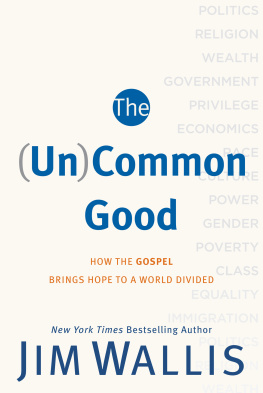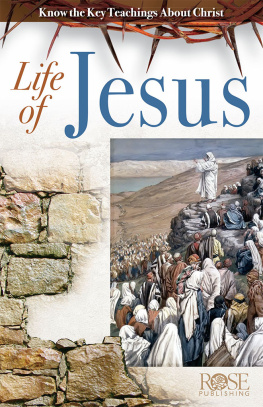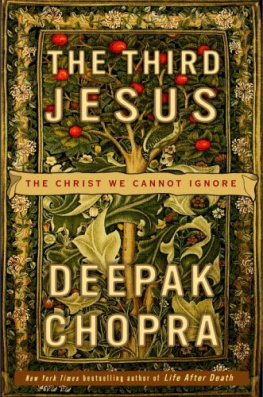This book is dedicated to the Reclaiming Jesus elders, whose collective spiritual discernment and courage led to a fresh confession of faith for these times, helping to ignite a movement that has already inspired millions to reclaim Jesus from cultural, religious, and political captivity (the elders are all listed at the end of the ). This book is also dedicated to all those young pastors and leaders I meet, around the country and the world, who are already reclaiming Jesus in their local communities and churches. They are the ones who now inspire me and give me hope.
Contents
Soul Food
Two thousand years ago Jesus of Nazareth began a movement. It was a movement of people for whom Jesus was the very center of their lives, and his way of unselfish, sacrificial love, their way of life. Scholars sometimes call this the Jesus Movement. And it is the earliest origin of Christianity.
A few years ago, Jim Wallis and I ran into each other after a service in Washingtons National Cathedral. We each knew of the other, but we didnt really know each other. Soon after that, we got together for a quick bite to eat and for some conversation.
But that quick bite quickly turned into a soul-food feast. While we were not eating at a soul-food restaurant, the conversation we had was food for the soul. And we discovered that we are soul brothers, if you will, brothers in Christ. We talked about Jesus of Nazareth, his teachings, his example, his Spirit, and the cultural complicity of much of contemporary Christianity.
We realized that we shared real concern for the soul of Christianity in America. Its not an exaggeration to say that Christianity in America is in danger of being hijackednot by emergent secularism, but by being popularly identified with right-wing political agendas; by the propagation of a so-called prosperity gospel; and, far too often, by being associated with thinly veiled religious animosity, often directed at Muslims, by sometimes subtle, religiously disguised racial bigotry and supremacy, nationalism and nativism instead of genuine patriotism, the exaltation of narrow-mindedness, antipathy toward scientific knowledge and learning, sexism, homophobia, and on and on. While this may not be the reality of Christianity on the ground, so to speak, and while genuine Christianity is not in the pocket of either the left or the right wing, or any other human ideology for that matter, the perception is very real. And perceptions often become reality, unless a counternarrative emerges. Hence, the crisis of which Jim speaks so articulately and profoundly.
That meeting and meal between Jim and me also led us to ongoing conversations and the formation of a larger group of church elders to discuss and discern the challenge of these times, which resulted in a fresh confession of faith called Reclaiming Jesus, which Jim will say more about as you read on.
A few centuries ago Fyodor Dostoyevsky warned the church and Christians of this kind of crisis as an ever-present danger to genuine faith that would follow Jesus and his way of love. In his story within a story, The Grand Inquisitor, in his masterpiece The Brothers Karamazov, he makes it plain. In that tale, Jesus returns to earth during the days of the Inquisition, when religious leaders were controlling, imprisoning, and killing their fellow Christians and Jews, all in the name of Christ. It was evangelism by persecution. The unwelcome return of Jesus results in his arrest, and the Grand Inquisitor himself comes down to Jesuss cell to confront him.
The Inquisitor explains that the church of that time had been able to keep the people in line and therefore create an organized and complacent society. Everything is working perfectly, the Inquisitor argues, without allowing the people free will with all its messiness. If Jesus is released, all he will do is mess things up! Throughout the encounter Jesus says nothing, but simply responds with the kiss of peace.
The contrast is a powerful one! There stands Jesus of Nazareth, whose life and teachings are a threat not only to the surrounding society but, sadly, to a church that professes his name but tries everything possible to keep him and his message hidden away from view.
Dostoyevsky was writing a piece of fiction... but oh, how familiar that tale is in our own time and our own context. It has been so easy for the church in various generations, including our own, to disregard, disarm, and domesticate Jesus to the point that he may not even resemble the Jesus of the New Testament.
Not long before I wrote this, Jim sent an email saying that he had finished the book. I sent him a congratulatory email and said, I really do think your book is going to be a major contribution to the radical reformation of the face and the reality of a way of being Christian that looks like Jesus. Whenever Jesus of Nazarethhis actual teachings, his lived example, and his loving, liberating, and life-giving waytakes center stage, a revolution of love, a reformation of life, and a renewal of our relationship with God, each other, and all of creation is at hand.
This moment, fraught with problems and complexity, is likewise pregnant with a new possibility for the church and those called Christians.
This crisis may be a genuine opportunity to reclaim our roots, our origins, our true identity as Christians, by reclaiming Jesus of Nazareth and his way of love.
Now is the time to reclaim that bold and countercultural Jesus who said things such as blessed are the peacemakers, love your enemies and pray for those who persecute you, you cannot serve God and wealth, and love your neighbor as yourself.
Now is the time to reclaim that Jesus who turned expectations upside down with parables about a good Samaritan, a prodigal son, a persistent widow, and the Last Judgment.
Now is the time to reclaim that Jesus who was unafraid to sit with those who others considered unacceptable, unwilling to be co-opted by the powers that be, undeterred in reaching out to the friendless and the needy, the cast down, the put down, and the disinherited.
Now is the time to reclaim that Jesus who Dietrich Bonhoeffer called the man for others. The Jesus who showed what love looks like, giving up his own life not for anything he could get, but for the good, the well-being, the welfare, the salvation and redemption of others.
Yes, there is a crisis of Christianity. But Jim, like the angelic messengers in the Christmas story, brings us good news of great joy. For the Jesus, born of Mary, can, as the Christmas carol O Little Town of Bethlehem says, be born in us today.
Yes, there is a crisis, but this crisis is an opportunity. An opportunity to reclaim Jesus and to be reclaimed by him. An opportunity for a way of being Christian that actually looks something like Jesus of Nazareth and his way of love to emerge as the face of Christianity in America.
Yes, there is a crisis. This can be an opportunity for the church to reclaim its roots, its true origins. Now is the time for the church to become more than merely the church as culture perceives us.
This may be an opportunity for us to become the twenty-first-century realization of the Jesus Movement of old. And in so doing, to find our soul.
May your reading of this book be for you what that conversation I had with Jim a while back was for me: a real soul-food dinner!
Bishop Michael Curry,
Presiding Bishop of the Episcopal Church
When I used to visit one of my mentors, Dorothy Day, the founder of the Catholic Worker movement and perhaps now headed toward sainthood, at the movements Mary House on the Lower East Side of Manhattan, a big graffiti quote on the side of a building always caught my attention. It read,













